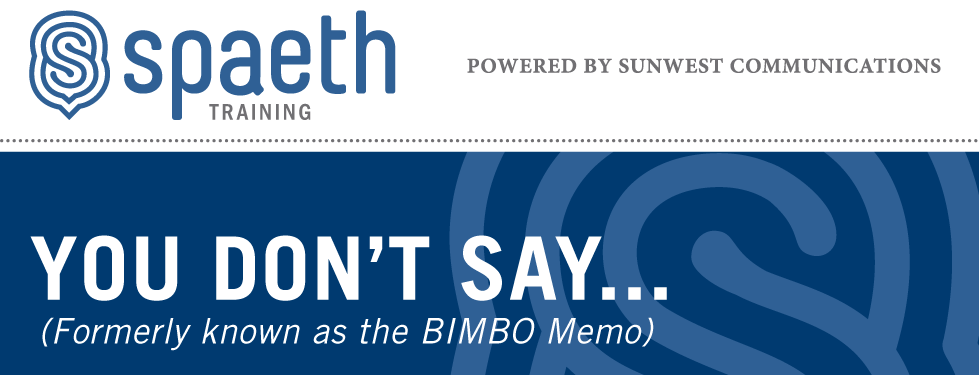[Newsletter] 2.13.24 | “I’ve not met, flown with, visited, or had any contact whatsoever with Epstein,”
February 1, 2024What a great month for communication lessons! Click through to the full newsletter to read a great lead line in a New York Times article, an example of why media training really matters, a government agency has no sense of humor (and doesn’t want you to have one either), along with this month’s top blunders. Do we need a new section titled “Trash Talk” to report on Aaron Rodgers? An example of hedged speech, the CEO of Wayfair insults his employees and several more examples of apologies, well, one is a non-apology, but another gets an A+!
THE WINNING COMMUNICATIONS BLUNDER
“I’ve not met, flown with, visited, or had any contact whatsoever with Epstein,” wrote comedian Jimmy Kimmel in the war on words with Jets quarterback Aaron Rodgers. See the expanded blurb in the full newsletter about trash talk and the power of bad words. Kimmel does go on to add, “Nor will you find my name on any ‘list’ other than the clearly-phony nonsense that soft-brain wackos like yourself can’t seem to distinguish from reality.” We know Elizabeth Taylor claimed there’s no such thing as bad publicity, but we may be reaching the limits. The back and forth may be entertaining, but we doubt it’s good for Mr. Kimmel’s overall image. He ended by writing, “Keep it up, and we’ll debate the facts further in court.” We’ll be watching.
Twitter, @Jimmy Kimmel, January 2, 2024
THE RUNNERS-UP
“The only thing that we’re not doing is we’re not shooting people who come across the border, because of course the Biden administration would charge us with murder,” said Texas Governor Greg Abbott about beefed up security. What can we say about this misguided crack which was picked up and shared by half the world. It’s a shame because the border situation is both a real crisis and a fascinating constitutional question. Much more boring but we wish the Governor had stuck to his comments about the need to have secure borders.
The Hill, “Abbott: ‘We’re not shooting people’ who cross the border because feds ‘would charge us with murder,’” January 11, 2024
“There’s not an expectation of an energy emergency,” said Pablo Vegas, CEO of ERCOT, Texas’s energy grid, adding, “We are not calling for conservation at this point in time.” At the time of this comment, it was 15 degrees in Texas with a windchill below zero and memories of the disastrous power loss three years ago when many people’s pipe’s burst leaving them without water. The lesson? Be careful of inverted speech.
San Antonio Current, “Texans asked to conserve energy Monday as expected demand likely to put strain on electric grid,” January 15, 2024
A GREAT LINE
We at You Don’t Say (formerly the BIMBO memo), love great writing and occasionally there is an opening line, called a ‘lede’ in journalism, which should be shared. Maureen Dowd of the New York Times, started a recent column, “These are the men that try The Times’s soul,” a play on Thomas Paine’s famous line, “These are the times that try men’s souls.” You don’t have to agree with Dowd, and it’s not hard to guess whom she is talking about, but you can admire a great line!
The New York Times, “Is Trump hell?” January 6, 2024
WHY MEDIA TRAINING MATTERS
Dallas-based siblings who went viral on TikTok were asked “What do you love about Mexico?” when touring Mexico City. When asked if they liked Mexico City, Yahritza complained that traffic noise and police sirens woke her up during the night, and Mando and Jairo said they would prefer their home food, such as chicken wings, to the world-famous cuisine of the Mexican capital. As children of immigrants and in a band that specializes in regional Mexican music, the trio still said they much preferred the US. Not the right response. The newfound fame crashed to earth. A good lesson in why media training is so important.
The Dallas Morning News, “Yahritza y Su Esencia explores identity and success as second-generation Latinos,” January 5, 2024
HUMOR
“You have two years to stop being funny,” said the Federal Highway Administration. The problem? In an effort to get motorists’ attention, states have moved from boring generic safety warnings to humor. Massachusetts says, “Use Yah Blinkah” and Utah advises “Driving Basted is for Turkeys.” We love it and point to Southwest Airlines’ long-established use of humor in its mandatory safety briefings. The FHA is concerned people are finding them too funny – and thus distracting. We think it’s worth the risk.
The Wall Street Journal, “Feds to Highway Signs: You Have Two Years to Stop Being Funny,” January 11, 2024
THE POWER OF ‘BAD’ WORDS
Building on our Winning Communications Blunder of the Month, Aaron Rodgers and his pal ESPN’s Pat McAfee are no strangers to using bad words. “I didn’t know anyone was going to hear it because it was just on digital,” claimed ESPN bad boy star, Pat McAfee, referring to executive management as “old hags.” That qualified as another ‘kind of stupid’ comment given his show averaged 1.7 million views this month and so the story that should have never been became a story that keeps on going.
USA Today, “’Old hags’” Maybe executive just knew all along Pat McAfee would be trouble for ESPN,” January 8, 2024
HEDGED SPEECH
“It sort of just appeared,” said Dr. Anthony Fauci, former head of the National Institute of Allergy and Infectious Diseases and the self-proclaimed leader of the COVID containment strategy during the pandemic. At testimony before a House Select Subcommittee, Fauci very unconvincingly explained that they could not identify an authority or research supporting or explaining the rationale or mandate for the six-foot social distancing rule. “Hedged” speech, the use of words like “sort” and “kinda” and “pretty” – as in “I’m pretty sure” – is to be avoided because it undercuts the impact of a statement. Notice the phrase makes the headline. What should he have said? “We did the best we could with the knowledge we had at each moment of time.”
New York Post, “COVID ‘6-feet’ social distancing ‘sort of just appeared,’ likely lacked scientific basis, Fauci admits,” January 10, 2024
NOT A GREAT APOLOGY
“Working long hours, being responsive, blending work and life, is not anything to shy away from,” wrote Wayfair CEO Niraj Shaw in a December end-of-year letter to employees, adding, “There is not a lot of history of laziness being rewarded with success.” Now, the company announced it’s laying off 13 percent of its workforce, explaining “We went overboard in hiring during a strong economic period.” The missive was widely criticized as “CEO tells workers to work harder,” and it’s not how we would have recommended handling it. This wasn’t the worst letter we’ve seen, but it lacked empathy. Generally, it’s important to thank employees for their work and contribution – and certainly not accuse them of laziness – and to commit to treating those who will be let go fairly and with respect.
USA Today, “Wayfair CEO Niraj Shah tells employees to ‘work longer hours’ in year-end email,” December 22, 2023
NON-APOLOGY
“We regret the impact this has had on our customers and their passengers,” was all Boeing had to say in the aftermath of the globally publicized and terrifying incident where a panel of an airplane blew off at 16,000 feet. They also said, “We are committed to ensuring every Boeing airplane meets design specifications and the highest safety and quality standards.” But the statement had all the empathy of the disclosure forms in prescription medicine flyers.
CNN.com, “A terrifying 10 minute flight adds to years of Boeing’s quality control problems,” January 8, 2024
A REAL APOLOGY
“Wow, I was wrong. I was badly wrong and I’m here to apologize,” wrote sports columnist Jason Gay making him the second writer to loudly apologize for dismissing and mocking Detroit Lions coach Dan Campbell. The first, last December, was USA Today’s Mike Freeman. Both responded negatively to Campbell’s super charged speech during an early press conference where he said, “We’re going to bite a kneecap off,” and both have now become believers. Witness the Wall Street Journal’s headline, “The Lions Are a Super Bowl Threat.” What does it say about sports in this age of non-apologies and scripted apologies that the most authentic and heartfelt ones are from these guys?
The Wall Street Journal, “The Loud Man Who Made the Detroit Lions a Super Bowl Threat,” January 22, 2024
HEARTFELT OR NOT?
We still give White House chief of staff Jeff Zients a salute for calling former Arkansas Gov. Asa Hutchinson to apologize for the Democratic National Committee’s crack that it was “a shock to those of us who could’ve sworn he had already dropped out,” when the governor announced his withdrawal from the race for Republican presidential nominee.
The Wall Street Journal, “Notable & Quotable: a White House Apology to Asa Hutchinson,” January 20, 2024
TWO APOLOGY VIDEOS FROM THE SAME CEO
Be sure to watch the two apology videos in the links below from Kyte Baby CEO Ying Liu. These examples highlight the difficulties of a scripted apology but also the perils of ‘letting it all hang out.’ The content in the first is actually quite good but it sounds scripted and delivered via TelePrompTer, and it was. This is a reminder that writing for a TelePrompTer requires writing for the speaking voice. And, delivering it requires coaching. Those TV anchors really do have talent and experience! Now, the second “heartfelt” apology. You may be tempted to give that high marks but think about this…it’s so emotional and promises so much that the CEO has set a precedent she’s going to find hard to match. And, we can only imagine what the company’s lawyers had to say.
FOX 4 KDFW, “Kyte Baby Controversy: North Texas company faces backlash for denying remote work for mom of premature newborn,” January 23, 2024
MSNBC.com, “This trendy maker of baby clothes treated a new mom with old fashioned disrespect,” January 23, 2024
“You Don’t Say” is a reminder not to repeat and deny a negative word because of how the listener hears words. When you repeat and deny a negative word, the listener is likely to overlook the denial and hear the opposite of what the speaker is trying to say.

